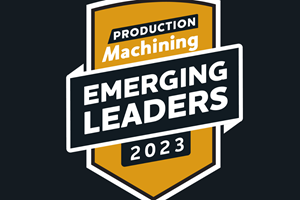Shop Addresses Skills Gap by Starting Vocational School
Custom Machine was struggling to find qualified machinists, and its president saw little being done about the skills gap, so he started a vocational school to train new machinists.
About 15 years ago, Carl Pasciuto had a realization while doing the census for his shop, Custom Machine. “I was always the young guy,” he says. “I wasn’t the young guy anymore, and there weren’t too many people behind me.” He knew he needed to bring in more employees, but like many shops, he was having difficulty finding people who were qualified. He’s had a sign in front of the building for a while, advertising open positions in nearly every department.
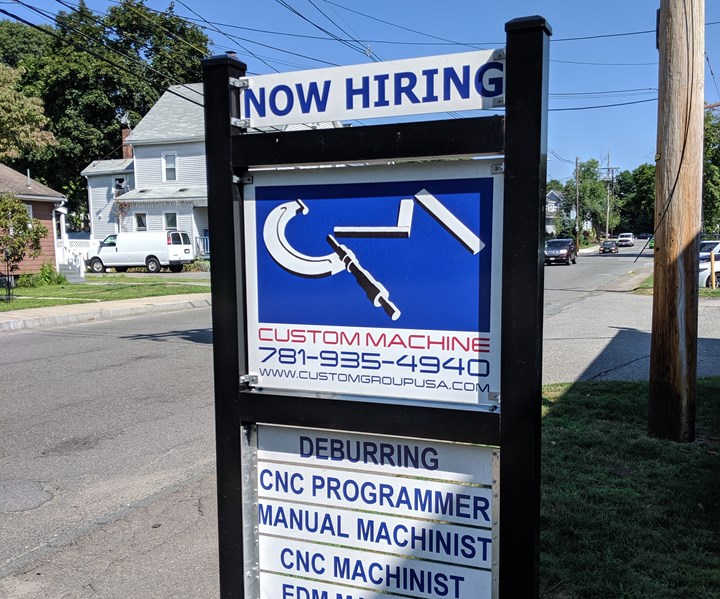
Like many shops, Custom Machine struggles to find qualified machinists. The company’s president, Carl Pasciuto, realized he would have to find and train the company’s own workforce, so he founded the Center for Manufacturing Technology.
These challenges were compounded by buzz about growing the American manufacturing industry. “Everybody says, ‘Oh, we’re going to bring back manufacturing,’” Mr. Pasciuto says. “I kept saying, ‘You’re going to start a war we can’t fight. We don’t have any soldiers.’”
Mr. Pasciuto saw little being done to address these challenges. “There’s a lot of good intentions, but no one is actually really doing it,” he says. So, he wrote and formalized a curriculum for an apprenticeship program that was based on how his father trained him. “And it morphed into this somehow,” he says.
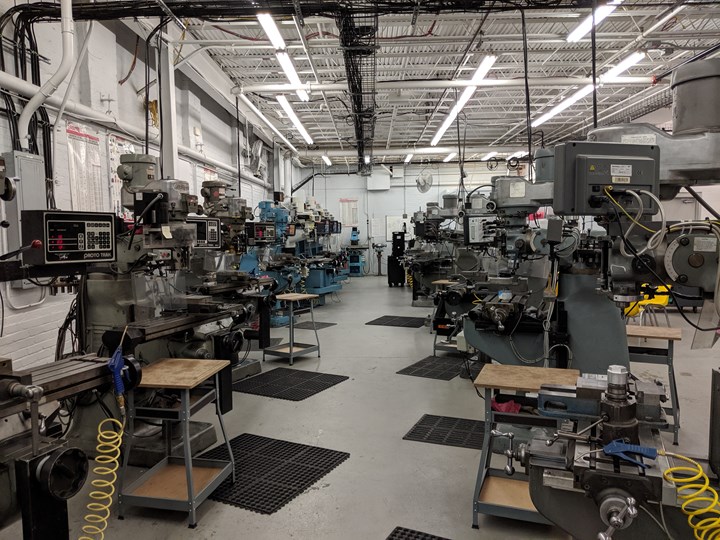
The Center for Machining Technology’s lab includes a range of equipment for students to practice machining skills.
“This” is the Center for Manufacturing Technology, a state-licensed vocational school. Both the school and shop are owned by the Custom Group, for which Mr. Pasciuto serves as president and sales team leader. The school’s facility is located next to Custom Machine in Woburn, Massachusetts, and includes labs and equipment for welding and machining, as well as classrooms for training and programming, and machine control simulators. Some of this equipment is donated by sponsors such as Haas and Miller.
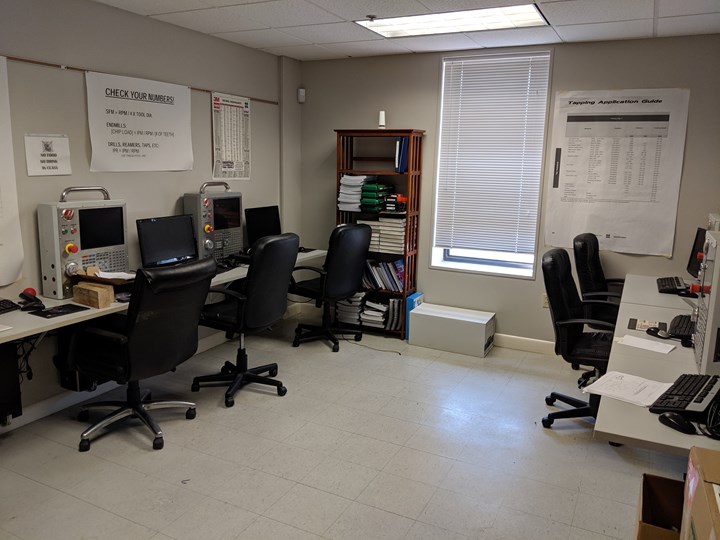
Students learn concepts in the classroom before putting them into practice in the lab.
The Center for Manufacturing Technology offers a range of programs, including its General Machine Shop Practices course, a 16-week program covering basics of manual and CNC lathes and mills, as well as blueprint reading, tolerances, the structure of metals and grinding. Graduates of this program receive a CMT certificate and as many as four NIMS credentials. Other programs cover manufacturing best practices, Mastercam, inspection and mold milling.
The school finds students for these programs in a number of ways. It sits on a number of school boards, and is on the board of directors of a number of other organizations, including MassMEP and the Greater Boston Manufacturing Partnership. It also works with its workforce development board. “There’s a lot of involvement,” he says.
Another opportunity that the Center for Manufacturing Technology has taken advantage of is corporate training programs for larger companies, including some of the machine shop’s customers. These companies are also feeling the effects of the skills gap. “They have the same problem,” Mr. Pasciuto notes. The school can write training curricula based on its customers’ needs. He gives the example of a company with a union of machinists. The machinists are categorized into levels based on experience (A, B, C, etc.). If the company knows that a portion of its level A machinists are about to retire, it can hire the school to train level B machinists to become level A, and level C machinists to become level B, and so forth. “Give us the job description, give us the criteria, and we’ll teach it so they can get to the next level,” he says.
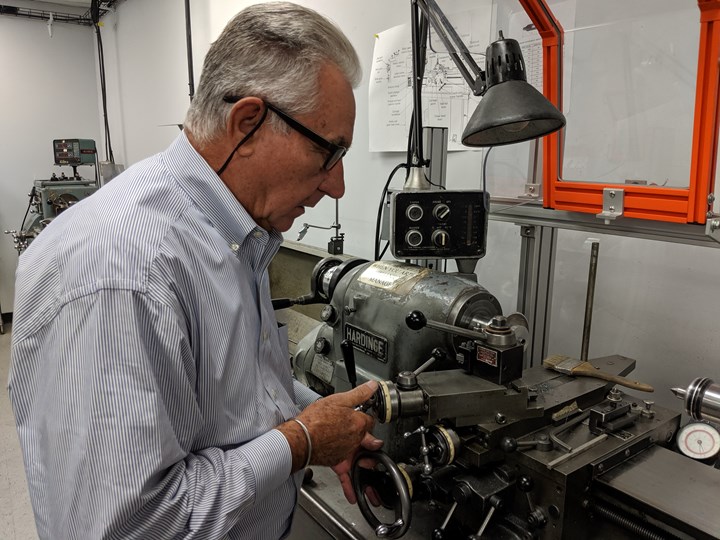
Many of the school’s instructors, mentors and trainers are retired employees of Custom Machine, including Carl Pasciuto’s father, who founded the shop.
One unique aspect of the school is that retired employees of Custom Machine serve as instructors, mentors and trainers. Among them is Custom Machine’s founder and Carl Pasciuto’s father. “I told him if he had a USB port in the back of his head I’d download everything,” Carl jokes. “Because you can’t take it with you.” Mr. Pasciuto’s father has been working with the school for 10 years now, and he teaches just about everything the school offers. “I have 55 years of experience—I should be able to say something!” he says. He also enjoys being able to help the industry. “The way I see it, the trade was good to me, so give it something back.”
Mr. Pasciuto’s father agrees on the importance of training the next generation of machinists. “To maintain the skill and the workforce, we have to put people out there,” he says. And the people the school puts out don’t only go to work for Custom Machine. “We also place our students throughout our competitor base. We do that at no charge because [the students] circle around and they keep learning,” Carl Pasciuto notes. He estimates that 20 of the program’s graduates have gone on to work for Custom Machine. “It’s a little trickle of water in the pipe,” he says. “It keeps us going.”
Custom Group USA | 781-935-4940 | customgroupusa.com
Related Content
2023 Emerging Leaders Strengthen Their Staffs, Solve Problems
Superb critical thinking, top-notch leadership skills and a passion for building a strong team are a few of the common traits held by this year’s five Production Machining Emerging Leader award winners.
Read MoreJob Candidate Questions and What They Tell Us
Individuals who ask thoughtful, original questions in the interview set themselves apart.
Read MoreEmerging Leader's Dedication to Education
Instilling confidence throughout a shop floor can do wonders for company morale while increasing productivity.
Read MoreTraining Is More Than a Skills Upgrade
Training is more than a skills upgrade. Training is a process that creates a virtuous cycle for your performers, culture and shop. Why do we train? Why do we need to train?
Read MoreRead Next
Meet Production Machining's 2019 Emerging Leaders
Production Machining has discovered a lot of young talent in the industry, and we want to share the stories of 20 of these young leaders with you.
Read MoreProduction Machining 2018 Emerging Leaders
Young professionals are a vital asset to the precision machined parts industry, and it is important to acknowledge those who are making strides toward shaping the industry’s future. Production Machining is recognizing our industry’s young talent who were nominated by their peers through our new Emerging Leaders program.
Read MoreStandardized Controls Aid Shop's Apprenticeship Program
Cox Manufacturing’s commitment to standardization, from the parts it makes to its machine controls and apprenticeship program, is an important factor in its growth.
Read More










.jpg;maxWidth=300;quality=90)






